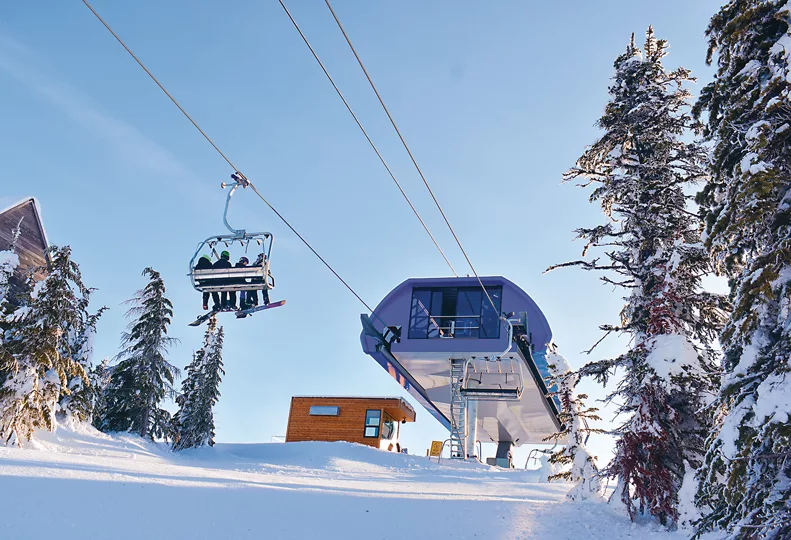Catching up with 49 Degrees North Mountain Resort
Ski area sees upgrades under new ownership as residential plans remain uncertain

The $7 million Northern Spirit Express chairlift at 49 Degrees North, installed in 2021 under the resort’s new ownership, can move more skiers at a faster pace than the main lift it replaced.
| 49 Degrees North Mountain ResortWhile long-envisioned plans to develop a ski-in, ski-out community at 49 Degrees North Mountain Resort have languished, the resort itself has seen significant improvements valued at several million dollars in the last five years, says Rick Brown, director of skier and rider services.
Additionally, plans are in the works to add summer attractions, including a bike park, scenic lift rides, and eventually a mountain coaster, Brown says.
The Journal’s last substantial report on 49 Degrees North, about 60 miles north of Spokane and near Chewelah, Washington, was in the spring of 2019. At that time, John Eminger had sold the resort operations to Chewelah Mountain Resort Lands LLC, an affiliate of Kellogg, Idaho’s Silver Mountain Resort, which was acquired three years earlier by Seattle businessperson Tryg Fortun.
Eminger initially stayed on at 49 Degrees North as general manager and retired later that year after 23 years as the resort’s owner and operator.
The longtime owner had planned for years to develop up to 2,200 residential units, 800 hotel rooms, and up to 360,000 square feet of commercial space with a total estimated value of $500 million in Sunrise Basin near the base of its Sunrise quad chairlift, on the east slope of Chewelah Mountain. In 2018, however, the resort sold roughly 70 acres of the privately owned 320-acre Sunrise Basin holdings to Angel Peak Holdings LLC, of Coeur d’Alene.
Brown says the development site has gone through litigation, receivership, and ownership changes. While he says he’s uncertain of current ownership status, the resort has received some indication that development similar to what has been previously proposed is still being envisioned.
“We’re hoping they're able to get that moving forward again," Brown says.
Stevens County Assessor’s records lists the most recent owners of the development site as two affiliated California-based entities: Alpine Glades I LLC and Alpine Glades II LLC. Assessor’s records also show at least two individual lots within the development site have separate owners.
Most of the 2,250-acre resort is leased through the Colville National Forest.
Looking ahead, 49 Degrees North is planning a bike park development with lift access, a mountaintop bistro, and expansion of its snowmaking system, including a second reservoir. The resort is waiting on a record of decision from the Forest Service before moving ahead with surveying and engineering work.
Brown says construction could start in the fall “if everything goes incredibly smoothly,” but more likely will begin next spring.
“We’re hoping to have summer operations up and running by summer 2026,” he says.
Brown estimates the snowmaking expansion and new reservoir will cost in excess of $1 million and likely will be constructed mostly by the resort’s in-house crew.
The resort will invest $2.5 million in the bike park over a three- to five-year period, Brown says, adding that the resort is working up conceptual designs for the park under consultation with a team from Whistler, British Columbia, that specializes in such facilities.
Further on the horizon, 49 Degrees North envisions adding a mountain coaster, which Brown describes as a gravity-powered, potentially year-round ride that would wind through trees from about midmountain to the base area.
“It will be a cool attraction that doesn’t require skills and fortitude that skiing or biking requires,” he says.
Meantime, the new ownership has installed the $7 million Northern Spirit Express detachable quad chairlift, replacing the Banaza main summit lift in 2021.
The lift cuts travel time to seven minutes—less than half the travel time of the old Banaza lift.
“It transports more people at a faster pace,” Brown says.
Brown claims Northern Spirit is the longest lift in the state with a linear distance of over 1 1/4 miles.
Northern Spirit was installed by a specialist team from Salt Lake City-based Doppelmayr USA Inc., the company that manufactured it.
The resort also has replaced its handle tow lift with a new, fully covered Sunkid conveyer-style surface lift, which has a greater ease of use for beginner skiers.
Brown says the resort has invested more than $1 million in recent years in snowmaking capabilities, including 15 snow guns and its first 1 million-gallon reservoir.
“Last year, we were able to open earlier than we would have without it,” he says of the snowmaking system. “We were able to make snow throughout the season.”
While skier visits were below average last season following busy COVID-era years, Brown says, “Without snowmaking and other improvements, our operations would certainly have suffered.”
Revenue has been trending upward with the exception of last year, which he describes as a slight dip.
“In general, we’re trending up with increases in visitation as we’ve created more space in everything from parking to inside spaces to additions in terrain,” he says.
The resort has 88 runs under the new ownership, up from 82 prior to recent improvements.
The resort’s workers currently are completing interior improvements in a 7,000-square-foot Sprung Structures prefabricated building that was erected last summer.
Brown says the $500,000 structure, which will house skier services and an equipment rental and repair center, was erected in-house under supervision of a Sprung Structures team.
He says an in-house team also erected a more conventional 7,000-square-foot heated maintenance structure, which can store six snow groomers, and likely cost significantly more to construct than the skier-services building.


_c.webp?t=1763626051)
_web.webp?t=1764835652)

